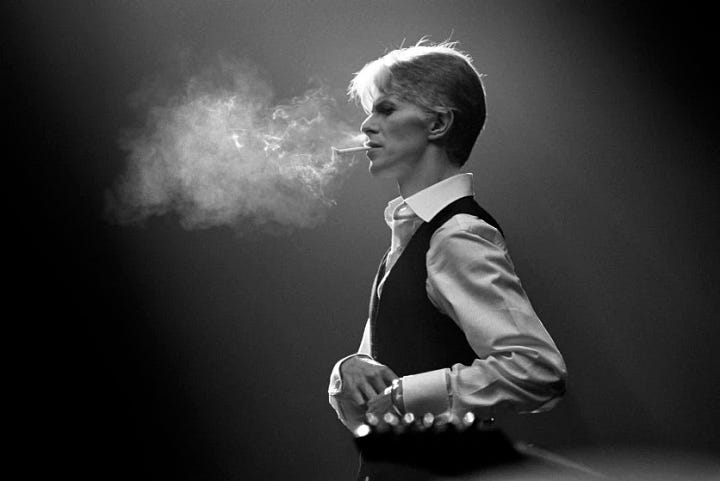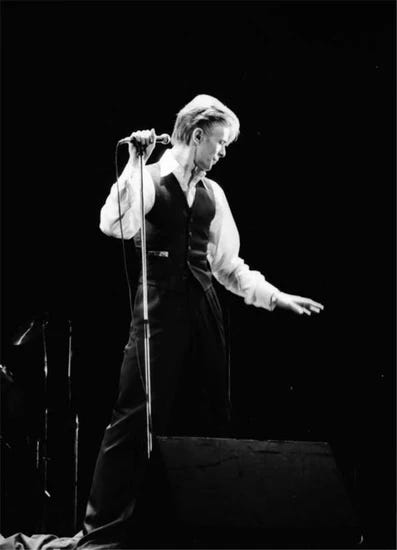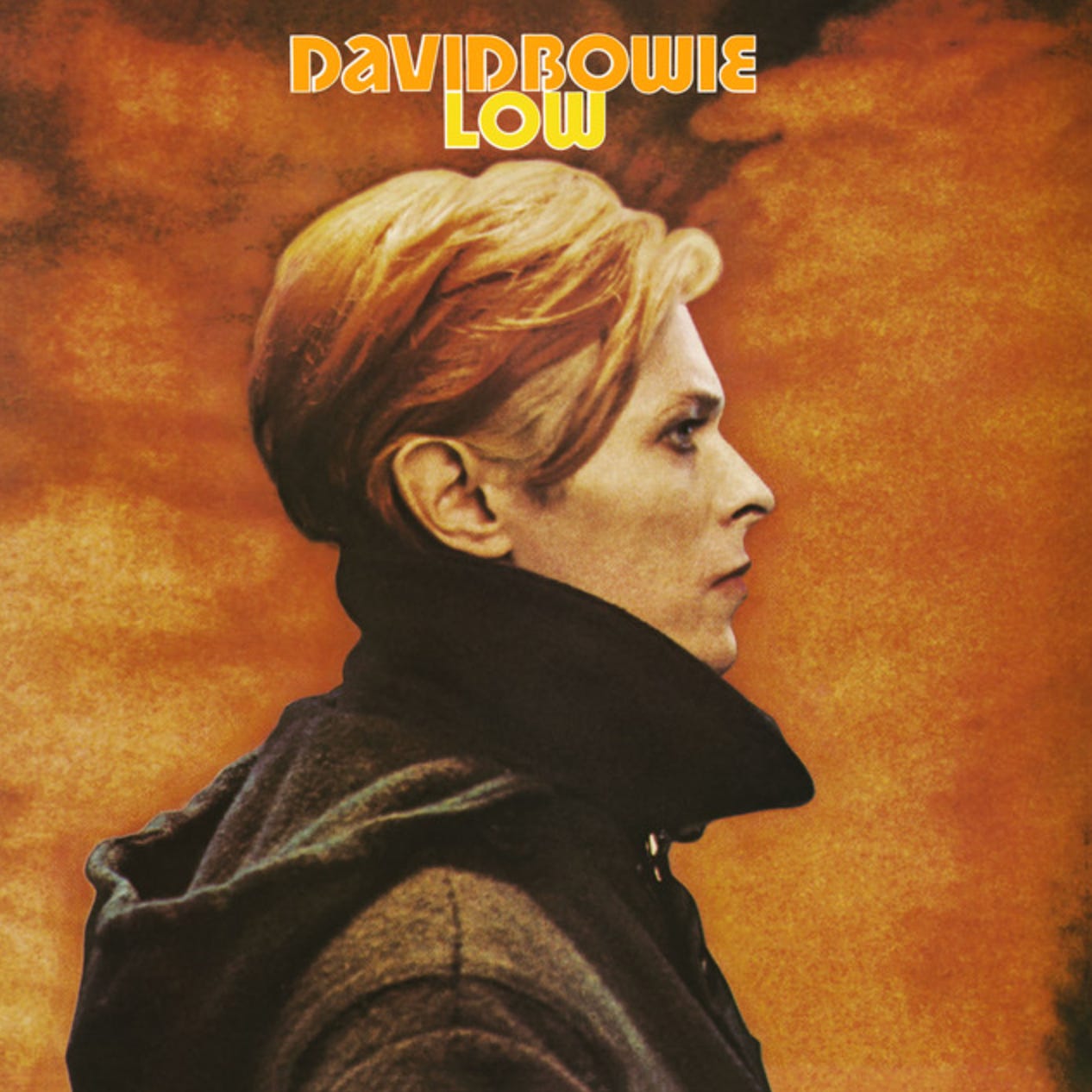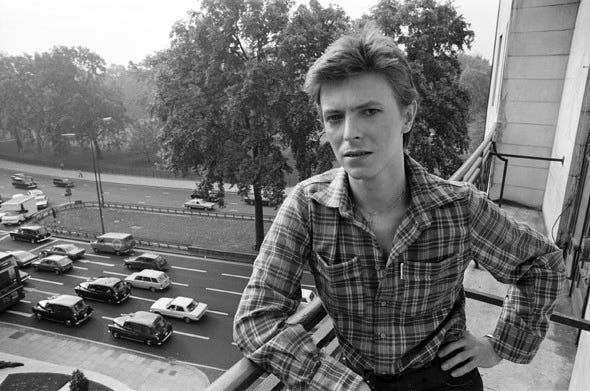the eleventh studio album by the english art-rock musician David Bowie, released on january 14, 1977 through RCA Records. it has a length of 38:26 minutes and 11 songs on it.
David Bowie’s first album of his “berlin trilogy”, including Heroes (1977) and Lodger (1979). as The Idiot (1977) was recorded before Low, it has been referred to as the unofficial beginning of his berlin period. it’s said that:
the “true berlin trilogy” consists of The Idiot, Low, and "Heroes", with Lust for Life a "supplement" and Lodger an "epilogue"
in 1974, he became seriously addicted to drugs, mainly cocaine, which affected his physical and mental health in the following years. he recorded his following two albums Young Americans (1975) and Station to Station (1976) under drug influence, attributing his growing addiction to los angeles, where he moved from new york in 1975.
"i know it was in l.a. because i've read it was."
the first ideas for Low came into his mind when he started working on the soundtrack of the movie The Man Who Fell to Earth, in which he played the main character. after he presented his material to the producer, it got rejected as unsuitable. the producer preferred a more folk-styled sound. six month later bowie sent him a copy of Low, saying: “this is what i wanted to do for the soundtrack. it would have been a wonderful score.”
after the rejecting, he decided to leave los anageles, free himself from the drug culture, and moved to europe. there he began with the rehearsals for his 1976 isolar tour, which served to promote his album Station to Station. famous for his so called “personas”, like the celebrated Ziggy Stardust, he developed another, controversial figure during this tour. as The Thin White Duke he made statements about adolf hitler and nazi germany which were partly interpreted as a sympathy for fascism. the look and character were influenced by his role Thomas Jerome Newton, he played in The Man Who Fell to Earth. he introduced The Thin White Duke in the title track of Station to Station: “the return of The Thin White Duke, throwing darts in lovers' eyes”. the duke was a hollow man who sang songs of romance with an agonised intensity while feeling nothing. he was wearing a white shirt, black trousers and a waistcoat. Bowie himself described the character as:
"a very aryan, fascist type; a would-be romantic with absolutely no emotion at all but who spouted a lot of neo-romance."


Bowie clarified, that while performing as one of his characters, everything we see is theatre. it’s pure clown. but blamed himself later for his behaviour, saying it was a dangerous period, that he was at the end of his physically and emotionally tether with serious doubt about his sanity.
“i'm using myself as a canvas and trying to paint the truth of our time on it.”
after finishing the tour, he booked studio time at the cahâteau d'hérouville in france, where he started producing Iggy Pops album The Idiot who joined Bowie on his isolar tour, trying to become sober with him. during this time he didn’t feel like writing. he rather wanted to lay back and get behind someone else’s work. Bowie composed the songs, Pop wrote the lyrics, lying on the studios floor, in response to Bowie’s tunes. after becoming interested in the german genre krautrock, influenced by Tangerine Dream, Neu!, Kraftwerk and Harmonia, The Idiot and Low are heavily inspired by it. as i said, The Idiot has been called the unofficial beginning of Bowie’s berlin period, as it is the same sound he explored in the berlin trilogy. for mixing the album, they travelled to the hansa studios in west berlin. and moved there after falling in love with the city, what marked the beginning of a new era.
Bowie already booked another sessions at the cahâteau d'hérouville, making sure to release his album before The Idiot. the owner, Laurent Thibault, opined that "Bowie didn't want people to think he'd been inspired by Iggy's album, when in fact it was all the same thing".
at the beginning of the recording, some musicians who worked with him on the album, weren’t fans of his “new” sound idea, because it did not correspond to their experience. Bowie thought that RCA would feel the same and added: “we don't know if this will ever be released, but i have to do this.” two weeks into the recordings, the co-producer Tony Visconti played his first compiled version to Bowie, who was surprised and enthusiastic that they had an album. the recording time/ atmosphere was described as “upbeat and relaxed”. the recording was largely drug-free (whatever that means).
“that was the first instance in a very long time that i'd gone into an album without anything like that to help me along. i was scared, because i thought that maybe my creativity had to be bound up with drugs – that it enhanced my ability to make music. but that album turned out okay."
Mr. Bowie i can say it turned out really good! also without drugs. i think we should take an example from it and remind us that creativity doesn’t has to be reinforced by drugs.
the album was finshed at the hansa studios berlin.
as Bowie suspected, RCA wouldn’t be happy with the album, which was confirmed after he received a rejecting letter, saying they want more, something like his previous albums. he kept this letter on his wall at home. he refused to make any changes and after trying to prevent its release, RCA eventually released Low on january 14, 1977.
(little spoiler: it became a commercial success)
the cover artwork was designed by Bowie’s school friend George Underwood. Bowie is seen as the character Thomas Jerome Newton from The Man Who Fell to Earth. this movie had an huge influence on him, since he referred to it quite often. with the design choice he wanted to underline the connection between the movie and the album.
Low is Bowies first exploration of electric and ambient music. it goes more into a psychedelic direction. side one is still a bit more poppy and has shorter songs on it while the second side is darker and comprises longer, mostly instrumental tracks. we get less lyrics in general. songs like Speed of Life and A New Career in a New Town, should’ve had lyrics, but Bowie didn’t find the right words, so he left them as instrumentals. he said that side one was about himself and his "prevailing moods" at the time and side two is about his musical observations of living in Berlin.
the opening track Speed of Life is fantastic and is the perfect one to introduce us into his new era. it’s a 2:47 instrumental song that directly takes and puts you into the album. the second song Breaking Glass continues there and gives us his first few vocal lines of this album. the electric guitar is the focus. What in the World features backing vocals from Iggy Pop and talks about a little girl who is stuck in her room. we can hear a a lot of synthesiser beeps and guitar sound. still in a very harmonica way. same with the next one Sound and Vision. soft voice, synthesiser, the subdued guitar and mechanistic drums. it’s probably the song with the most vocals, which reflects his mental state following his long period of drug addiction. Always Crashing in the Same Car gifts us with really spacious noises. Be My Wife reflects Bowie's feelings of loneliness, his inability to settle, and his longing for a deep connection. With A New Career in a New Town he is obviously talking about his move to berlin, but without words! he uses a harmonica solo to impress his feelings, accompanied by a dull, intense bass.
with the first note of his first song on the second side Warszawa, we notice that there is a change. a complete new sound. could be a complete new album. this 6:27 minute long song is an psychedelican epic! while listening to this you will go on a deep journey in your mind, discovering something you haven’t experienced yet. it’s something beautiful and free but with a little feeling of pain and suffer. what might be over now. same with Art Decade. feelings of melancholy and beauty! the last two songs Weeping Wall and Subterraneans, create a more painful sound as he uses a vibraphone, a xylophone and deep wordless vocals, vibrating into your soul. he composed Subterraneans as a portrait of “the people who got caught in East Berlin after the separation”, including an remarkable saxophone solo.
i interpret Low as a journey, a discovery of something new, something hallucinating. in a beautiful and mind freeing way. this is what he wanted to show us.
Low is haunting, his first symphony and a psychedelican epic.
and i think it was predictable that this album would be met with critical opinions.
“a new low point for the artist”
“all time low”
“a state of mind beyond desperation”
“who needs this shit?”
but i mean that’s what critics say after you release something they’ve never heard of you before. showing a different side. presenting your new self. these people have simply not arrived in the new era. they see someone else in him and have not noticed that he has changed significantly over time and has evolved.
in spite of all the album was a success! it stayed in the UK charts for 30 weeks and for 20 in the US. and not to forget about the influence he had with this album on the whole music developing. BBC MUSIC said: "without Low, we'd have no Joy Division, no Human League, no Cabaret Voltaire, and i bet, no Arcade Fire. the legacy of Low lives on." and i can agree. Joy Divisions original name was Warsaw, inspired by the song Warszawa.
my favourite quotes about this album:
“the album flows together into a lyrical, hallucinatory, miraculously beautiful whole, the music of an overstimulated mind in an exhausted body, as rock's prettiest sex vampire sashays through some serious emotional wreckage."
“Low is more than songs and sounds. the creative partnership behind the record forged a feeling, a mood, a place. like very few of the best albums ever recorded, Low contains a universe you can inhabit, for 40 minutes at a time. it's Bowie's masterpiece.”
“transports the listener to certain frontiers of place and thought in a very powerful way. a moment of pure discovery that most other records have failed to surpass”
"a record that hurtles toward an undefined future while embracing ambiguity, as well as an album about rebirth, which is why it still possesses the power to startle.”
my fav’s: Speed of Life, Sound and Vision, Warszawa
many musicians worked on this album, while Bowie, Tony Visconti (co-producer) and Brian Eno (keyboard) were most responsible.
can you guess what we will listen to next?
german, kraurock, trance
J.P.
let’s talk about music! share your thoughts with me! what song are you listening to right now?







Can !?